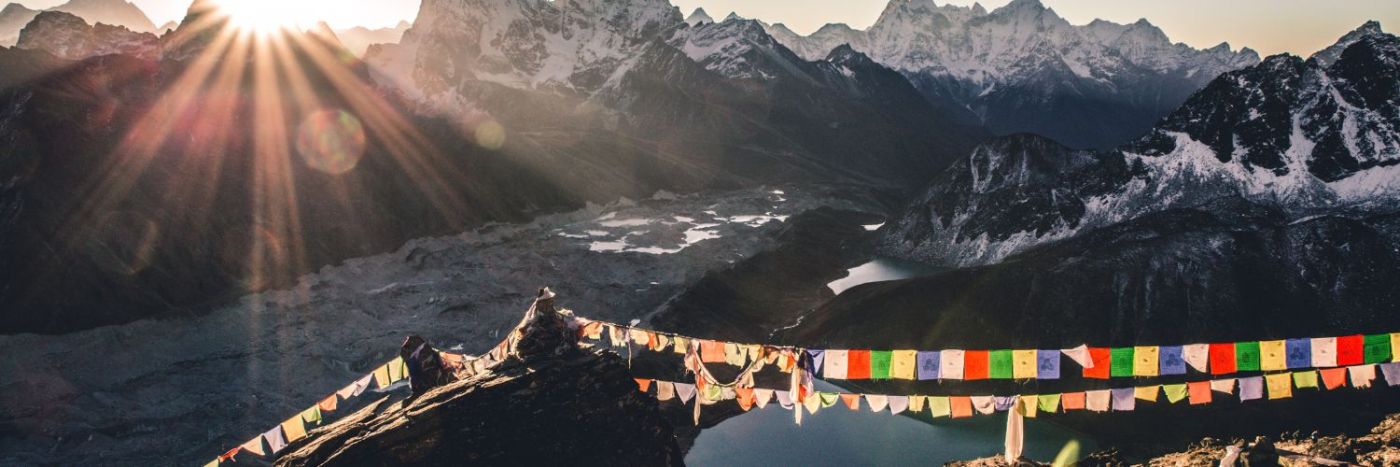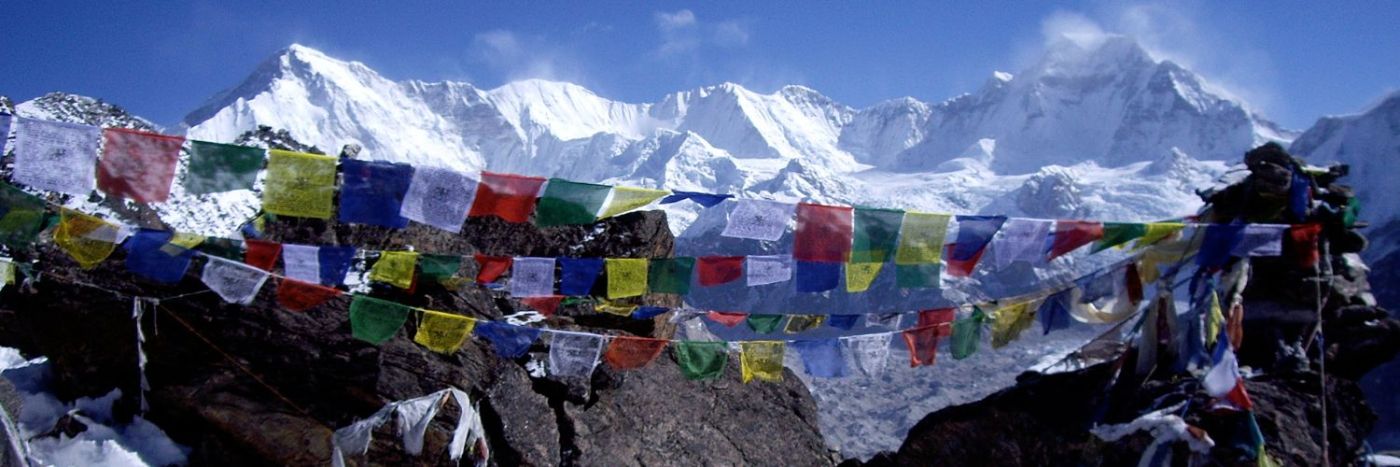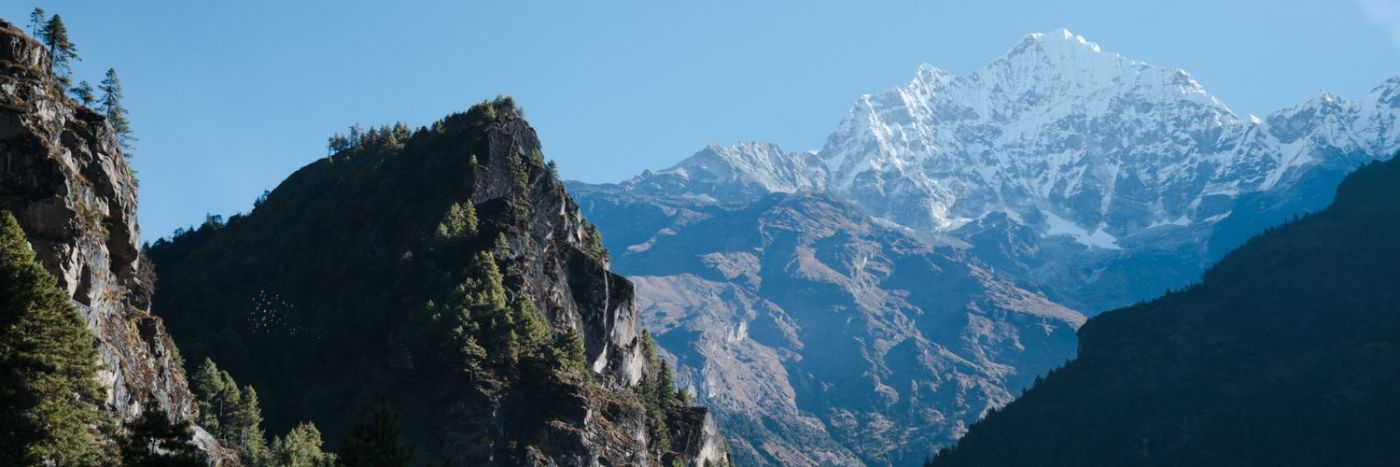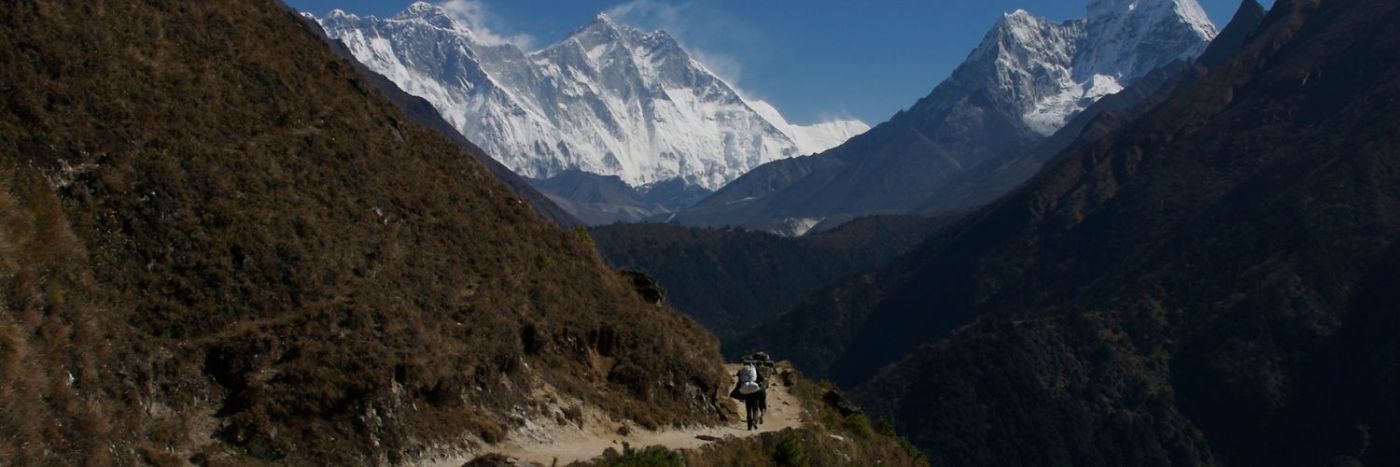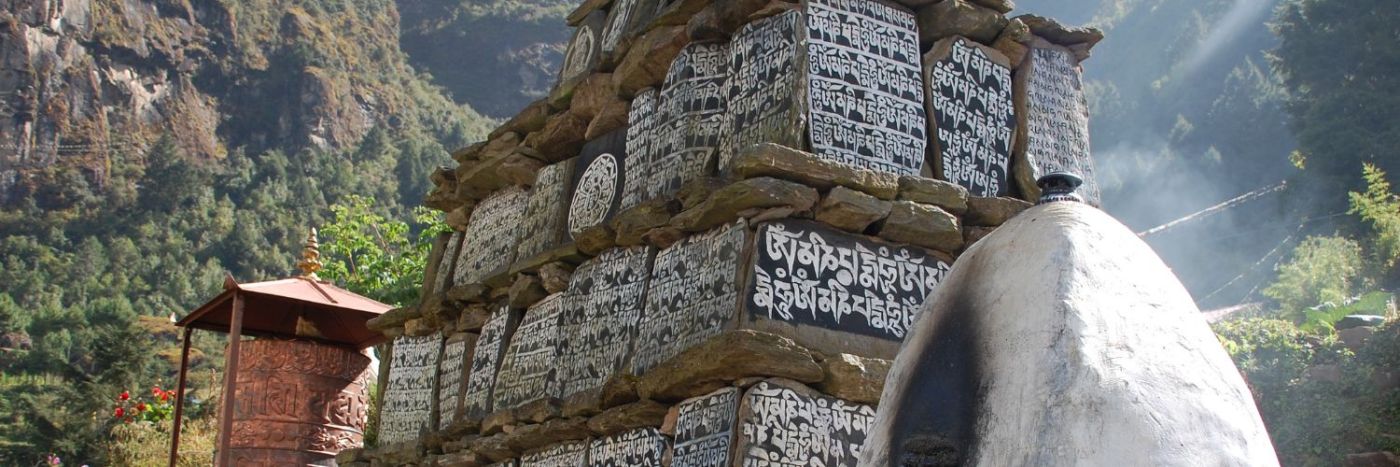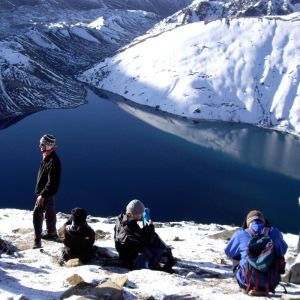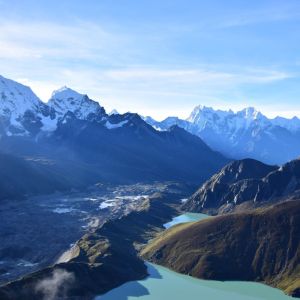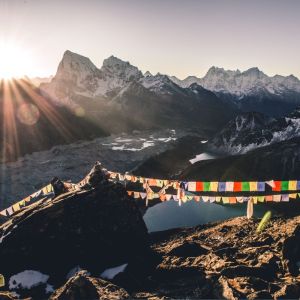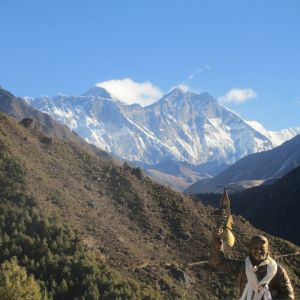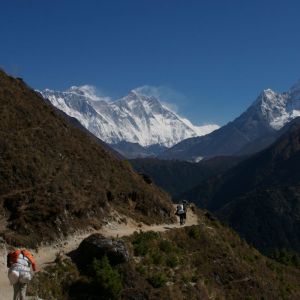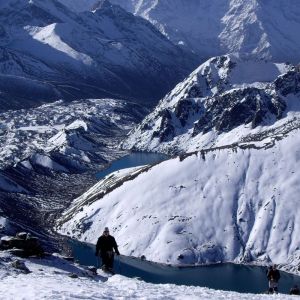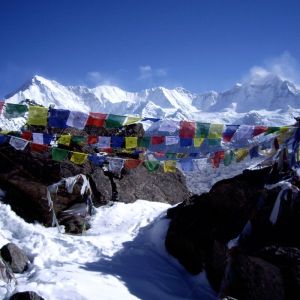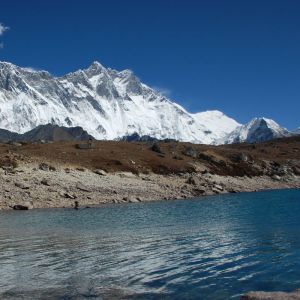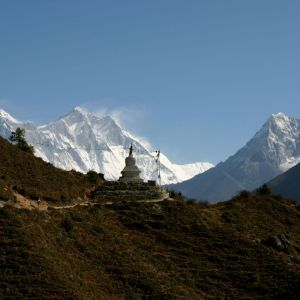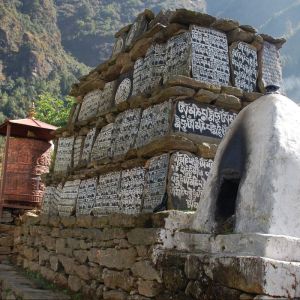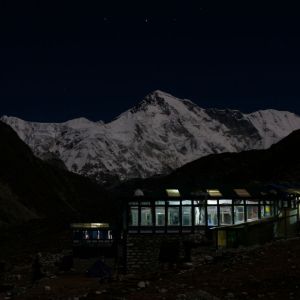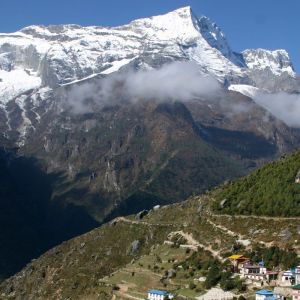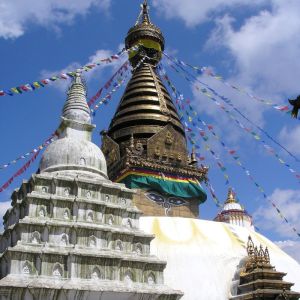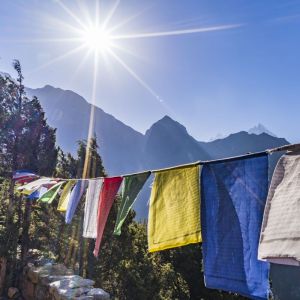- Overview
- Map & Itinerary
- Essential Info
- Pics & Vids
- Dates & Prices
Highlights
- Discover the stunning turquoise Gokyo Lakes and summit Gokyo Ri (5,357m)
- Immerse yourself in Sherpa life in Namche Bazaar and the remote village of Phortse Gaon
- Trek through lush forests, cross high passes, and follow the Dudh Koshi River surrounded by towering peaks
- Enchance your acclimatisation with circular treks around Everest Viewpoint and Khumjung
- Explore the UNESCO sites of Swoyambhunath and Durbar Square, delving into Nepal’s cultural treasures
- Receive a complimentary Water-To-Go bottle on departure this trip to minimise our plastic foot-print in Nepal.
Overview
Embark on an unforgettable journey through the heart of the Himalayas with our Gokyo Ri via Gokyo Lakes Trek. This challenging adventure takes you to the stunning turquoise lakes of Gokyo, surrounded by towering snow-capped peaks. Along the way, you’ll summit Gokyo Ri, offering breathtaking panoramic views of Everest and the surrounding giants of the Himalayas.
Throughout the trek, you’ll be immersed in the rich culture of the Sherpa people, visiting traditional villages like Namche Bazaar and the secluded Phortse Gaon. Experience authentic Sherpa life, witness their legendary mountaineering heritage, and explore their vibrant communities nestled in the high-altitude landscapes.
With plenty of time for acclimatisation, guided by knowledgable local guides, and a well-paced itinerary, this trek ensures both adventure and safety. Combined with a cultural exploration of Kathmandu’s World Heritage Sites, this journey offers an incredible blend of natural beauty, adventure, and cultural immersion.
Day 1: Arrival and transfer to hotel (20mins approx)
Welcome to Nepal. Meet and greet at the airport. Your Trek Guide will be waiting for you inside the airport arrival hall holding an ‘Adventurous Ewe’ board.
Private transfer through the maze of Kathmandu to your hotel, the famed Kathmandu Guest House. Centrally located in the eclectic and cosmopolitan tourist hub of Thamel. After settling in, your Trek Guide will hold a pre-trek briefing. Afterwards, he/she will also take you on a short orientation walk around the hotel surrounds for 30mins approx.
Included
Transfer: group transfer at nominated time
Accommodation: Kathmandu Guest House (3*) – deluxe room twin share
Meals: Welcome dinner
Day 2: Guided tour in Kathmandu in the morning. Drive to a hotel near Ramechhap Airport (Manthali) in the afternoon
Following breakfast you experience a locally guided visit to couple of the World Heritage Sites in Kathmandu:
Swoyambhunath – a.k.a. ‘Monkey temple’. Perched on a pedestal high on the hilltop, it is acclaimed as the oldest stupa in the world and is influenced by both the Nepalese and Tibetan forms of Buddhism, which attracts constant stream of pilgrims from all around Nepal.
Kathmandu Durbar Square – the oldest and the most authentic part of Kathmandu with centuries old temples, old Royal palace, residence of ‘Living Godess’ and vibrant bazaar. Walk back to the colourful tourist hub of Thamel through the bustling vegetable and spice markets of Asan – the oldest market square of Kathmandu. The labyrinth of backstreets and alleys leading from one bazaar or chowk to another seems nothing less than pure theatre!
After lunch break, we drive south-west out of Kathmandu towards Sun Koshi river valley for a night in Manthali near to Ramechhap airport. During peak trekking seasons, to ease the air traffic congestion and lessen the chances of weather-induced flight delays/cancellations, flights to & from Lukla take place from/ to Ramechhap airport.
Driving duration: 5hrs approx
Included
Accommodation: Freedom Resort (simple hotel with en suite facility; the best available in the region. Twin room share)
Meals: Breakfast, Lunch, Dinner
Day 3: Early morning flight to Lukla (20-25mins approx). Trek to Phakding (2610m)
An early morning stunning flight to Lukla (2820m), the gateway to the region of the legendary Sherpas. We re-group in a nearby teahouse in Lukla where we meet with the rest of our crew (assistant guides & porters).
Begin your trek northward towards Phakding, following winding paths bordered by stone walls. Enjoy lunch along the way in the scenic village of Thado-Koshi, perched above the river that shares its name, with the majestic Kusum-Kangarru peaks forming a stunning backdrop.
Trek duration: 2.5hrs approx.
Included
Accommodation: Basic Lodge
Meals: Breakfast, Lunch, Dinner
Day 4: Trek to Namchhe (3440m)
Trace the rushing Dudh Koshi River as the trail ascends northward, winding through lush forests of rhododendron, magnolia, and towering firs, leading up to Namche Bazaar. Known as the ‘Sherpa Capital’ of Khumbu, this is the largest village in the Everest region. In the late afternoon, take some time to explore the vibrant village of Namche.
Trek duration: 6hrs approx
Included
Accommodation: Basic Lodge
Meals: Breakfast, Lunch, Dinner
Day 5: Acclimatisation day in Namchhe
Trek to the Everest viewpoint and enjoy a circular acclimatisation walk through the nearby villages.
Hike duration: 3-4hrs approx
Included
Accommodation: Basic Lodge
Meals: Breakfast, Lunch, Dinner
Day 6: Trek to Phortse Tenga (3680m)
From Namche, the trek begins with an ascent to the Syangboche airstrip, followed by a journey to Khumjung for lunch, the largest village in the region. The path then winds around the sacred slopes of Khumbila peak, traversing through dense birch forests and ascending grassy, treeless slopes to a stupa situated at the top of a rocky ridge (3992m), offering spectacular views of the surrounding mountains. The trail then levels off as it heads toward the Gokyo Valley, diverging from the busier Everest Base Camp trail. It continues with a steep climb up a rock staircase tucked into a narrow cleft within a large boulder, leading to a prominent chorten atop the ridge in Mong La. From there, the trail steeply descends via switchbacks down a sandy slope to the Dudh Koshi river, finally reaching the quaint village of Phortse Tenga.
Trek duration: 5hrs approx
Included
Accommodation: Basic Lodge
Meals: Breakfast, Lunch, Dinner
Day 7: Trek to Dole (4100m)
The path to Gokyo can be misleading, potentially leading to too rapid an ascent if our trekking days aren’t carefully planned. To ensure proper acclimatisation, we allocate three days to reach Gokyo, even if two of those days are relatively short.
Departing from Phortse Tenga, the trail initially climbs steeply, then levels off to contour high above the valley, offering exceptional views of the Kantega, Thamserku, and Ama Dablam peaks. Roughly an hour past Phortse Bridge, you’ll catch your first glimpse of the towering Cho-Oyo (8153m) at the valley’s end. The trek now moves beyond the treeline and passes several impressive waterfalls on the way to the yak herding communities of Tongba (4015m) and Gyele (4050m). A short hike from there leads us to Dole, where you’ll spend the night.
Trek duration: 3hrs approx
Included
Accommodation: Basic Lodge
Meals: Breakfast, Lunch, Dinner
Day 8: Trek to Machhermo (4410m)
The day starts with a steep ascent, followed by a climb along the valley side, high above the river. Traverse sandy spurs as you make your way to Machhermo.
Trek duration: 3.5hrs approx
Included
Accommodation: Basic Lodge
Meals: Breakfast, Lunch, Dinner
Day 9: Trek to Gokyo (4750m)
As you ascend a ridge, the valley opens up before you reach Pangka and then dips briefly before climbing up to a large cave known as Nilibuk. Your path then continues to rise steeply, following a narrowly crafted staircase trail up to the first of Gokyo’s five stunning lakes. Gokyo itself is the highlight of your trip, with its heavenly array of five pristine turquoise lakes and the towering snow-capped mountains that loom majestically above them.
Trek duration: 5hrs approx.
Included
Accommodation: Basic Lodge
Meals: Breakfast, Lunch, Dinner
Day 10: Hike to Gokyo-Ri (5357m). Trek to Nha La (4400m)
Embark on a pre-dawn hike to Gokyo-Ri for a panoramic view of the Himalayas, including Mt. Everest. It will take approximately 1.5-2 hours to reach the summit and about 1-1.5 hours to descend the same route. After some rest and lunch, you’ll backtrack past the second lake to follow the alternative trail to Nha La, which will take around 4 hours. Nha La, being off the mainstream trekking paths, offers more rudimentary facilities and lodges compared to what you’ve experienced so far.
Trek duration: 7-8hrs approx
Included
Accommodation: Basic Lodge
Meals: Breakfast, Lunch, Dinner
Day 11: Trek to Phortse Gaon (3800m)
Follow the less-travelled, higher route to the secluded Sherpa village of Phortse Gaon. Nestled on a terrace, this expansive village is not only home to numerous renowned mountain climbers but also provides a deep insight into authentic Sherpa life and culture.
Trek duration: 5hrs approx
Included
Accommodation: Basic Lodge
Meals: Breakfast, Lunch, Dinner
Day 12: Trek to Namchhe (3440m)
Descending from Phortse Gaon, you will soon join the familiar trail that leads down to the trail fork at Kenjoma, from where you will take the mainstream Everest Base Camp trail.
Trek duration: 5.5hrs approx
Included
Accommodation: Basic Lodge
Meals: Breakfast, Lunch, Dinner
Day 13: Trek to Lukla (2800m)
Follow the same path you took at the beginning of your trek, descending along the dusty track to the banks of the Dudh Kosi. After crossing a few bridges, you’ll reach Monjo in about 2.5 hours. Continue retracing your earlier steps back to Lukla, where ample time awaits to relax in the Sherpa atmosphere. You’ll also enjoy an ‘end of the trek’ celebratory dinner with your crew to bid them farewell.
Trek duration: 7.5hrs approx
Included
Accommodation: Basic Lodge
Meals: Breakfast, Lunch, Dinner
Day 14: Early morning flight back to Ramechhap (Manthali). Drive back to Kathmandu
You’ll take the same road back to Kathmandu. Once there, you’ll gather one last time for a final night’s dinner and make any last-minute preparations for your flight back home.
Driving duration: 5hrs approx
Included
Accommodation: Kathmandu Guest House (3*) – deluxe room twin share
Meals: Breakfast, Lunch, Dinner
Day 15: Return home
Return home filled with an immense sense of pride and memories to last a lifetime.
Included
Transfer: From Hotel to Kathmandu Airport at designated time for nominated group flight
Meals: Breakfast only
Nepal has experienced more than it’s fair share of impacts over the past few years with devasting earthquakes, avalanches and COVID-19. We’re passionate about supporting the tourism industry to Nepal to help with it’s recovery, not just to the more frequented regions of Everest and Annapurna, but also to the less visited areas which include Langtang. The tourism industry contributed about 6.7% to Nepal’s GDP, while its total impact was US$ 2.2 billion. In addition, in 2019, tourism supported over one million direct and indirect jobs, or 6.7% of total employment. Approximately 80% of these jobs are in the most remote and resource-constrained regions.
2025 also marks the 10th anniversary of the earthquake which devastated so many areas of Nepal, including Langtang where this exped will stay for 1 night, in Nuwakot where we the group will undertake a 3-day project to help finish off the living facilities for hearing and speech impaired students at the nearby school.
We develop and host sustainable adventures to help support local communities and give you the chance to have a more meaningful travel experience. This exclusive expedition has been created in line with our Travelife Partner award in sustainable tourism.
On booking your Yala Peak Residential Expedition, you’ll receive all the exciting trip info via our free mobile travel app.
You’ll have access to your itinerary, trip countdown, live updates, contact info, weather forecasts, know before you go trip info, kit lists and much more at the touch of a button 24 hours a day via your mobile phone. No more unnecessary use of reams of paper to benefit the environment and the need of carrying around documents with you. A’ppy days.
With Adventurous Ewe being a small family business, we pride ourselves with providing personal, professional and friendly service. We appreciate that everyone has different levels of experience and reasons for wishing to embark on this exped and therefore require varying levels of support and guidance.
We’re here to help you every step of the way from the moment you join the flock all the way through to completing the challenge and beyond. Jim and Sue’s knowledge and expertise stems from dozens of years of travelling and exploring the destinations that we visit in order to fully support you in the lead up to your adventure. We’re here to help you with any questions, no matter how big or small, and it’s not often that you’re able to speak directly with the owners of the business who have so much passion for travelling in Nepal.
On booking this trip, we’ll provide you with the recommended flights for you to book either directly with the airline or through our helpful Flight Agent who is ATOL & ABTA protected as an additional cost. We pride ourselves in offering flights at a direct cost without any mark ups or commission.
Flights are not included in your travel package to give you the flexibility to travel from your nearest airport, use any frequent flyer points you may have or extend your travels in Nepal if you wish. The recommended flight times we provide will include airport transfers in Kathmandu. Should you arrive outside the group flight timings, you can simply catch a taxi or we can arrange a private transfer for you at an additional cost.
For any further info on flights, please feel free to get in touch with us at info@adventurousewe.co.uk.
It is worth noting that the general standard of driving throughout Nepal isn’t the same standards as in the UK and Australia, however, we insist on using a high standard of vehicle and driver for all of our transfers. In Nepal it is not a legal requirement to have seatbelts fitted in the back of vehicles, and while we try to use vehicles that do have rear seatbelts fitted, this cannot always be guaranteed. If you are unhappy about any aspect of the vehicle or the standard of driving, please speak to your Leader immediately.
Roadworks and infrastructure projects can cause delays on major roads within cities and highways between destinations. Road travel can also be disrupted due to demonstrations and bandhs (strikes) without warning. Major roadworks are currently ongoing in and around Kathmandu. Delays, traffic, poor road conditions and dust are a reality of road travel in Nepal.
All nationalities require a full passport that must be valid for 6 months beyond the intended length of stay. For the most up to date info, please visit the Foreign & Commonwealth Office website.
All foreign nationals, except Indians, are required to have a valid visa to enter Nepal. A valid Nepalese visa, which can be obtained from Nepalese diplomatic missions outside Nepal or on arrival in-country, is also required to enter Nepal. Information regarding Nepalese visa and immigration can be found on the Government of Nepal’s website, www.nepalimmigration.gov.np. Please note, requirements often change and it is your responsibility to obtain any required visas for this trip. Therefore, we recommend that you check with the nearest embassy or consulate of your chosen destination(s), including any countries you may be transiting or transferring through.
Some local governments provide guidance on what visas their citizens need. To help, we’ve gathered a selection of useful links below.
- Australia: www.smartraveller.gov.au/destinations/asia/nepal
- Canada: www.travel.gc.ca/destinations/nepal
- United Kingdom: www.gov.uk/foreign-travel-advice/nepal/entry-requirements
- USA: www.travel.state.gov/content/travel/en/international-travel/International-Travel-Country-Information-Pages/Nepal.html
You can obtain your visa in advance or on entry. If possible, apply in advance as queues on arrival can be very long. Please note, the Immigration Department of Nepal has suspended visas on arrival for certain nationalities – please check if this applies to you with your nearest embassy or consulate .
When you arrive at Tribhuvan International Airport in Kathmandu, there will be three lines. If you have already secured you visa, go straight to the Immigration line. If not:
- Fill in a tourist visa form at the electronic kiosks. After inserting your passport, the machine will automatically fill out an application form, take an electronic photograph of you and print a paper slip. If the machine won’t read your passport, complete the details manually using the touchscreen. We recommend taking a passport photo with you just in case.
- Proceed to the visa fees collection counter and pay the visa fee (in cash, if possible). Make sure to keep the receipt.
- Go to the relevant immigration desk and present your tourist visa form, payment receipt and passport to obtain your 15-, 30- or 90-day visa stamp. Please check you have been given the correct visa duration.
Travel Insurance is an important part of any booking. It is compulsory that everyone who travels with us has taken out adequate travel insurance which includes, among other things, cover for the full value of your trip, medical (emergency, evacuation and repatriation) arrangements, activities undertaken, personal liability, cancellation, curtailment and loss of luggage and personal effects and pandemic travel cover.
For UK residents we have partnered with Campbell & Irvine Direct to provide you with a travel insurance. If you would like to obtain cover for your trip please feel free to contact specialist Insurance Brokers, Campbell Irvine Direct for a quote.
You must send your Travel Insurance Policy to Adventurous Ewe no less than 8 weeks prior to departure.
GLOBAL RESCUE MEMBERSHIP
For peace of mind whilst trekking in the mountains, Global Rescue provides short term membership giving access to travel, security, medical advisory and evacuation services up to $US500,000. They’re a specialised field rescue company, and assist from the point of illness or injury by getting you to the closest and most appropriate medical facilities to get stabilised. Once fit to fly if you require additional inpatient treatment Global Rescue will further evacuate and repatriate to your home hospital on record. These services are all covered through their upfront membership fee with no claims process. For more info, please click here.
There are no required vaccinations for Nepal. However, recommended vaccinations include tetanus, typhoid, hepatitis A, hepatitis B, cholera, Japanese encephalitis, rabies and tuberculosis. You will also need a yellow fever vaccination certificate if you’re arriving from a country with risk of yellow fever transmission or transiting for more than 12 hours through a country with risk of yellow fever transmission. Some travellers may also need proof of a polio vaccination. For the most up to date info on vaccinations, please consult with your GP or travel healthcare practitioner 8 weeks in advance of travel or check the NHS government website ‘Fit for Travel’.
There is little to no risk of malaria in Nepal; therefore, antimalarial tablets are not usually advised although may be considered for certain high-risk groups. You may wish to consult your doctor or travel clinic for further advice.
Additionally, dengue fever, a tropical viral disease spread by daytime biting mosquitoes, is a known risk in Nepal with an outbreak in September 2022. There is currently no vaccine or prophylaxis, so take extra precautions (such as wearing full-length trousers, long sleeves and applying insect repellent during the day, dawn and dusk) to prevent being bitten.
Most of our trips to Nepal go to high altitudes where there is a risk of being affected by Acute Mountain Sickness. Our itineraries are designed to enable everyone to acclimatise to these altitudes, but you should be aware that it is still possible for you to be affected. Please refer to the Altitude Warning within the Trip Notes for further advice on AMS.
SEVERE ALLERGIES
If you have a severe allergy please inform us at the time of booking. We will do all we can to help, but unfortunately we are unable to guarantee an allergy free environment on this trip. You will need to carry your own treatment for the allergy with you, as ‘adrenaline auto-injectors’ are not carried as standard by AE leaders and crew. Whilst your leader is aware of our trekkers medical history, please also inform your leader on arrival of your allergy, and let them know where you keep your adrenaline pen.
Flight Safety in Nepal
This itinerary in Nepal involves domestic flights to access trekking areas. Nepal’s mountainous terrain, combined with changeable weather, makes flying conditions complex and challenging. Unfortunately, the safety record in Nepal is not on par with other countries, and incidents, including fatalities, are more common. In 2013, the EU flagged these concerns by placing all Nepalese-registered airlines on the EU banned list, preventing them from flying within EU airspace. While no Nepalese airlines operate in the EU, this ban serves as a warning for UK, EU & Australian citizens about the risks of flying in Nepal. Additionally, Nepalese airlines are generally not members of internationally recognized safety audit systems, and the Nepal Civil Aviation Authority (CAA) does not maintain the same safety standards as Western nations.
Flying in Nepal is, therefore, a known risk, and we encourage you to carefully consider this before booking your trek. For more information, please consult:
- The UK Foreign, Commonwealth and Development Office’s current travel advice for Nepal
- The Air Safety Network entry for Nepal
To address safety concerns, we reference independent air-safety auditors to visit Nepal to assess local carriers. We only use airlines that meet our safety standards, and in the event of an emergency, we have a list of approved helicopter carriers. If safety issues arise with a carrier, we immediately remove them from our list until they meet acceptable standards again.
Internal Flight Delays
Weather conditions at Lukla Airport can occasionally prevent flights to and from Kathmandu from operating. To account for this, we include an extra day at the end of the itinerary. However, bad weather may delay the start of your trek or your return.
If weather delays your trek’s start, we will aim to offer a shortened trek. If conditions continue to worsen, making the primary trek impossible, we will offer an alternative trek to another region in Nepal. If fixed-wing flights are grounded but helicopters are available, clients can opt to fly by helicopter for an additional cost of approximately $600-$800.
In the event of significant delays at the end of the trek, we will prioritise getting you on the next available flight to Kathmandu. If helicopters are operational, we may cover helicopter costs on a case-by-case basis to ensure you catch your international flight. As international flights are not included with your travel package, you will be responsible for rebooking your onward travel and any associated costs. If you book your international flights through our Flight Agent, they will help you with this.
Flights via Manthali Airport
Please note that all flights to and from Lukla now operate through Manthali Airport (RHP), located in the Tamakoshi River Valley, 132km east of Kathmandu. The drive from Kathmandu to Manthali takes about four hours early in the morning, while the return leg takes five to six hours due to heavier traffic. The flight from Manthali to Lukla lasts approximately 20 minutes.
Adventurous Ewe puts the safety and well-being of you, our leaders & crew and the communities we visit at the centre of all our operations, always. Your safety and well-being is our top priority.
The Yala Peak Trek is intentionally challenging and requires individual preparation as the trip is designed to take you out of your every-day comfort zone and achieve something amazing. Rest assured we have a thorough Safety Management System, indepth risk assessments and risk management systems in place.
SUPPORT
You will be accompanied by local qualified Mountain Guide/s. All our Guides are Remote First Aid trained and have extensive experience in leading teams in this region. They will be ultimately responsible for your safety on this trip. There will be radio or phone contact between Local Leaders & crew, the Office Base in Kathmandu and Adventurous Ewe HQ during your trek. In the unlikely event evacuation be required the National Park rescue service. All staff are highly trained with the evacuation procedures. A member of our staff will be carrying medical supplies should it be required.
If for any reason you need to leave the group early and come off the mountains, Sherpas will assist you with your descent and will arrange transfers, accommodation and medical care if necessary. All costs incurred due to an early descent will need to be covered by yourself before departing the hotel, this is why we insist on suitable travel insurance cover.
Many national governments provide a regularly updated advice service on safety issues involved with international travel. We recommend that you check the UK Foreign & Commonwealth Office Travel advice website or Australian Embassy in Nepal for their latest travel information before departure and ensure that your travel insurance covers you for all areas your itinerary covers.
We also ask that you please ensure you use your alcohol-based hand sanitiser at all times to minimise the spread of any germs throughout your fellow flock of trekkers!
LOCAL GUIDES
Our Local Guides are very experienced, knowledgeable and have the renowed warmth and hospitality of the Sherpa people. They are constantly self-driven to go above and beyond to ensure you will have an amazing experience. Mountain climbing for the local guides is more than just a career, it’s a passion which they are proud to share with others. Our Guides are responsible for ensuring the complete safety, well-being and enjoyment of the team whilst also retaining a flexible and supportive attitude. The Leaders/s have satellite phone, radio and mobile phone contact with base, the local office in Kathmandu and Adventurous Ewe’s HQ.
PORTERS WELFARE
We understand porters, and the whole mountain crew in general, are the heart and soul of our Nepal treks and we believe that fair treatment of our crew on the mountain is not merely an industry requirement but the tenet of every Manaslu expedition. Ensuring our crew is well paid, insured and cared for is a priority for us. When we trek, the entire group ‑ you, the guides and porters alike ‑ are a team who share the same needs for safety and well-being in this mountain environment.
We pride ourselves in small group travel to minimise the impact on the environment, to maximise your safety and wellbeing and to make your experience more authentic.
The minimum group size for the Gokyo Ri Trek to run is 8 people and the maximum group size is 12 people. Please note, we can run the trip for groups of 6 – 7 people, however there would be a slight price increase
You are most welcome to join this trek as a group of friends, family, colleagues, a private group or as a solo traveller. You are also welcome to use this trip as a fundraiser for the charity of your choice.
If you have a group of over 8 people, we would be more than happy to run a private trip for your team, your charity or your company. For any further info or to chat about running a bespoke trip, we’d love to hear from you at info@adventurousewe.co.uk
The Gokyo Ri via Gokyo Lakes Trek is a non-technical but challenging trek, with long days and steep ascents and descents. You will be crossing high passes and trekking at altitudes over 5,300m, so your legs will get a solid workout. Trekking poles are highly recommended, especially on the steeper sections, such as the ascent to Gokyo Ri. A good training plan prior to your departure will help you prepare for the demands of the trail, ensuring you can enjoy the experience.
The trek reaches a high point of 5,357m at Gokyo Ri, where the altitude can make breathing more difficult. A slow, steady pace is essential at these elevations, as the reduced oxygen can leave you short of breath. While this is not a race, a good level of fitness will make your trek more enjoyable and rewarding.
If you’re comfortable walking for 7-8 hours a day with ascents of up to 1,000m over consecutive days, you’ll be well-prepared for this trek. Success requires a solid fitness base, but equally important are determination, resilience, and a positive attitude to embrace the adventure and challenges along the way.
Please also be prepared for varied conditions and temperatures especially as you ascend higher. You are likely to be cold, washing facilities are minimal and the loos are different from the luxuries at home. On a day to day level remember that you will be hunkered down in lodges at altitude. You’re likely to be cold, washing and toilet facilities will be limited and basic, along with your accommodation. Your appetite may be affected by the altitude and as you get higher on the trek you are likely to suffer shortness of breath and many people experience difficulty sleeping. Remember that everyone on the trek is likely to be experiencing exactly the same symptoms, physical and mental, however this trek is undertaken as a team pursuit, we encourage strong teamwork and support.
When trekking above 2,500 meters, your body must adjust to the lower levels of oxygen available at higher altitudes. To help with acclimatisation, we have structured the Gokyo Ri via Gokyo Lakes Trek with gradual ascents and dedicated acclimatisation days, such as in Namche Bazaar, allowing your body time to adapt. However, even with careful planning, some trekkers may experience symptoms of altitude sickness, which can include headaches, fatigue, shortness of breath, disturbed sleep, nausea, and loss of appetite.
Everyone acclimatises at different rates, and while most of the team may experience mild discomfort, such as headaches, some may require extra care. Our experienced leaders and crew are trained to monitor and assist anyone experiencing more severe symptoms of Acute Mountain Sickness (AMS). During your pre-trek briefing, altitude sickness will be discussed in more detail, and you’ll be advised on how to manage it effectively. The key is to respect the altitude, know the signs of AMS, and communicate any symptoms to your leader promptly.
To minimise the risk of AMS, follow these essential guidelines: drink 3-5 litres of water daily, avoid alcohol and limit caffeine, walk slowly, stay warm, and eat well, even when your appetite is low. If you have any pre-existing medical conditions or take medications that might affect your ability to acclimatise, it’s important to consult your doctor before booking. While our team will do everything possible to help you achieve your goals, your safety is our top priority, and your local leader may decide to delay or halt your ascent if necessary for your well-being. Please respect their decisions, as they are made with your health and safety in mind.
A Trek Training Programme will be provided when you join this trip to help you with your preparations. We also have exclusive offers with our Training Partners and Communities – Her Spirit and Strength & Movement Coast, Peter Lant. For more info, please visit our Training & Preparation page.
The more you are prepared, the more you will enjoy the challenge.
Our motto is: Train hard, smile harder and enjoy the journey!
A full kit list will be provided when you register for this trek. Good kit can make the difference between a fantastic adventure and an uncomfortable one. Well worn in waterproof hiking boots are essential together with a good quality waterproof jacket AND trousers. An exclusive Adventurous Ewe discount code will be provided for the independent outdoor retailers, Crib Goch Outdoor Shop on registering for this mountain adventure.
The main trekking season in Nepal runs from mid-September to mid-May, with ideal conditions for exploring the region. Outside these months, the monsoon brings heavy rains, so we do not operate treks during that time. During the trekking season, weather conditions at most altitudes are generally comfortable for walking, with occasional rain or snow. Daytime temperatures in the Kathmandu Valley can range from 15°C to 35°C (59°F to 95°F), while at elevations around 3,600m, such as Namche Bazaar, temperatures can be around 10°C (50°F) and progressively lower as you ascend.
Within this broader trekking season, the post-monsoon/autumn period (mid-September to November) is the most popular time for trekking in Nepal. Daytime temperatures in Kathmandu will usually exceed 20°C (68°F), while on the trek, the weather is generally mild, with clear skies and stunning mountain views. However, at higher altitudes, the days can become cold and windy, and temperatures at night can drop as low as -10°C (14°F) or lower, particularly in late November.
As you progress on the Gokyo Ri via Gokyo Lakes Trek, expect a wide range of weather conditions—from mild, sunny days at lower altitudes to cold, brisk winds and freezing temperatures at higher elevations. Proper layering and preparation for varying weather are key to ensuring a comfortable and enjoyable trekking experience.
2 nights in Kathmandu Guest House, 1 night simple local hotel in Ramechhap (near to airport) and 11 nights in basic teahouses/lodges on the trek – all accommodation is on a shared basis
In Kathmandu we typically stay at the Kathmandu Guesthouse, located within walking distance of the Thamel district. All rooms have en suite facilities and there is a restaurant and an outdoor courtyard. There is free Wi-Fi in the lobby and login codes for the rooms are available at reception.
The teahouses are basic but adequate; please be realistic about what to expect in the mountains. Typically mattresses are provided in the huts and there is a basic dining room and basic toilets. Some of the basic teahouses we use are part of our local operators ‘Support Rural Nepal’ project -“Building a Future by Reclaiming the Past”. In restoring some fine, old buildings the process itself provided much needed employment for local artisans, which leads to some immediate prosperity within the local community. This is evident of the teahouse we use in Bandipur (depending on availability).
The hub of the teahouse is the dining room, usually decorated with colourful traditional rugs, sometimes with a stove or heater (some lodges charge a fee to put the heater on). Some tea houses above 3000m may not be heated due to local environmental restrictions. Occasionally kerosene burners can be used to heat common areas if requested. We recommend against using these due to the risk of carbon monoxide poisoning, and your leader will not offer this to you.. Most teahouses sell snacks and other essentials such as tissues, soap and toilet paper. Almost all lodges have electricity, but it is not wholly reliable, and lighting may not be bright enough to read by – a torch is essential. Electrical charging facilities are generally available only in the dining room (charged at approx. Rs150-350 per hour per device). Many of the lodges use solar power so sometimes there is not enough electricity for charging. A few of the lodges on this trek have Wi-Fi these days – in some areas it works well but in others it is slow and temperamental.
The bedrooms are now almost all twin-share (although very occasionally during peak seasons you may be asked to share with three to a room for the odd night). Beds with foam mattresses, bedsheets and a pillow are provided. Bedrooms are unheated and can get cold at night, so you will need to bring or hire a sleeping bag.
Most lodges have only one or two basic toilets and sometimes these are located outside the main lodge building. Toilets are usually Asian ’squat’ style; although some lodges have now installed ‘western style’ seated ones. Toilet paper is not provided so you should bring your own or buy it locally (please dispose of it in the bin provided – do not put it in the bowl). If there is not a flush handle, there should be a container of water to pour down – if it is empty (or frozen) please either refill it or ask the lodge to.
Some lodges now have hot ‘showers’ (charged at approx. Rs250-500 per shower). Sometimes a hot shower is simply a bucket of hot water and not a shower head.
Standards of cleanliness vary, especially in the peak trekking season and in winter when the water freezes at night. Please report any problems to your leader or the lodge and be vigilant in your personal hygiene regime – use soap or hand sanitiser before and after toilet breaks, snacks, meal times and after handling money. As a rule, the higher altitude you go to, the more basic the lodges and the more expensive food and services become.
Extra accommodation
If you would like to extend your stay, we can book extra nights before or after the tour for you in Kathmandu – please enquire at the time of booking or email us at info@adventurousewe.co.uk
Single Supplements
If you prefer your own room, we offer a single supplement for the hotel nights in Kathmandu only (subject to availability). While in the tea houses, single rooms cannot be guaranteed so these have not been included in the single supplement price paid in advance. However, if a single room is available on arrival to a tea-house, you can pay locally on a day-by-day basis.
FOOD: Breakfast x 14, Lunch x 13, Dinner x 14
In the teahouses breakfast will comprise of a choice of bread (a slice of toast, chapatti or Tibetan bread), a choice of egg (boiled, fried or omelette), and a choice between either muesli or porridge each day. Hot tea/coffee will also be served. On specific days, there will not be a choice for breakfast and either a trekkers breakfast (egg, hash brown, baked beans and toast) or a pancake with jam/honey will be served – these options are not available in all teahouses and so we have only included them in locations where they can be guaranteed. You may also be able to supplement your included breakfast with additional items on the teahouse menu should you wish, additional items that are not included in the set menu should be ordered and paid for separately.
Please note, some more remote teahouses/lodges are unable to provide an extensive menu due to irregular delivery schedules and during periods of bad weather or a high volume of trekkers, there may be a more limited menu choice.
Lunch will be taken at a teahouse en route – sometimes one of your guides will go ahead with the group’s order to make it more expedient. Dinner will be in the same teahouse that you sleep at (this is custom in Nepal as teahouses base their room rate on it).
Although most lodges have almost identical menus, they are reasonably extensive and offer a varied selection, ranging from traditional Nepalese dhal bhat to pizza and apple pie. Dhal bhat is the staple diet in Nepal and comes in many different forms but generally comprises some curried lentil dhal and meat or vegetables, some rice, and a pickle/chutney. Another popular snack is momos; a type of Nepalese dumpling, fried or steamed, filled with meat or vegetables.
Although meat is available in the teahouses, we advise against eating it on trek. The meat has often been carried in the heat from lower altitudes for several days before reaching the lodges and can cause stomach upsets or illness. Germs can also be spread by handling dirty money – we recommend using hand sanitiser, always.
If you have a gluten free diet, then we strongly recommend you bring some extra food and snacks with you to supplement the food on trek as there will be little variety available for you, particularly for breakfast. Even many of the soups are powdered and contain gluten. Gluten free breakfast options will be limited to vegetable fried rice and a choice of egg, and on specific days only, a trekkers breakfast (without the toast / with an extra egg) will be served. Breakfast options for vegans will be limited to a choice of muesli/porridge with water each day, and on specific days only, a trekkers breakfast (without the egg), or vegetable fried rice will be served. If you are lactose intolerant as opposed to vegan then the same will apply although you will also have a choice of egg each day.
If you buy imported food and drink whilst on trek you will spend more than the suggested amount.
We recommend bringing your own snacks or you can support local communities by buying snacks in Nepal. If you bring any snacks from home, we recommend removing as much packaging as possible and minimise any potential rubbish you bring with you in to Nepal.
WATER
Staying hydrated is important when undertaking any physical activity but particularly so at altitude where it is generally recommended to drink at least 3-4 litres per person per day. We strongly encourage you not to buy bottled water on trek as this contributes to the growing problem of plastic pollution in Nepal.
The teahouses sell boiled water for approx. Rs150-300 per litre (the price increases the higher you trek) which should not require treating. This is also perfect for a bedtime refill as it can double up as a hot water bottle. It is not recommended to drink untreated water from the taps or streams enroute. Adventurous Ewe has partnered with Water-to-Go, a filtration system that eliminates over 99.99% of all microbiological contaminants from any non-salt water source – for more info please click here. Adventurous Ewe trekkers will receive a free Water-to-Go on departure, and better still, 15% of the purchase value for replacement filters will be donated to our environmental charity partner, Cool Earth. Please note that if the water freezes it will clog up the filter – in this event, defrost before use by sitting the filter in lukewarm water for 10-15 minutes. Please help us reduce the volume of single use plastic in this pristine environment.
Adventurous Ewe has partnered with Water-to-Go, a filtration system that eliminates over 99.99% of all microbiological contaminants from any non-salt water source – for more info please click here. Adventurous Ewe trekkers will receive a free Water-to-Go bottle on departure, and better still, 15% of the purchase value for replacement filters will be donated to our environmental charity partner, Cool Earth. Please note that if the water freezes it will clog up the filter – in this event, defrost before use by sitting the filter in lukewarm water for 10-15 minutes. Please help us reduce the volume of single use plastic in this pristine environment.
Deposit: £195 per person on booking.
Balance: £1770 per person is due no later than 4 weeks prior to the trip start date.
Total cost: £1965 per person
Monthly payment plan
A monthly payment plan can be arranged for this trip. Please contact us for more information or to set up your plan. Simply email info@adventurousewe.co.uk or call 01492 588 069.
Book & Travel with Confidence
As well as carefully crafting amazing and meaningful adventures across the planet, we’ve made booking them as flexible, safe and as simple as possible.
For the latest info regarding booking and travelling with Adventurous Ewe, please visit our website.
Fundraising
You’re welcome to fundraise for a charity of your choice if you wish to do so. All sponsorship monies are to be sent directly to your chosen charity.
All your trip info will be sent to you through a mobile travel app which is free to download. You will receive an email from Adventurous Ewe with your personalised log in code for this app.
For the latest and greatest from the land of adventures, simply follow us at:
Facebook: @adventurousewe
Instagram: @adventurousewe
Youtube: Adventurous Ewe
LinkedIn: Adventurous-Ewe-Ltd
You’re most welcome to use the hashtags
#ewecandoit #thisflockrock #letsogadventure
Your Adventurous Ewe Leader/s and Crew will have a satellite phone, mobile phones and radios communications in case of emergencies. The team are trained to deal with these situations. Please ensure you listen to your Leader during these times and refrain from putting any posts on social media. Should you find yourself unable to continue with the trek, your Leader and crew will make the necessary arrangements. Depending on the situation, you will be met by the support vehicle (depending on access) and you will be transferred back to suitable accommodation or nearby medical facility as required.
Your Emergency Contact at Adventurous Ewe HQ is Jim Young on +44(0)7747 346 588.
COOL EARTH
We are very excited to have teamed up with leading climate change charity Cool Earth, who share our mission to protect the planet’s precious environment in a sustainable manner. The future of rainforest protection is where everyone makes a difference to climate change! We invest a % of our revenue into supporting critical conservation projects around the world through Cool Earth. You are most welcome to help make a difference too by sparing a few pennies. Please give what you can and help save the world’s rainforests today by clicking here. Just £2.50 will save 10 trees and lock up 10 tonnes of CO2.
Together, we can all make a difference in helping preserve this precious and wonderful planet. Thank-ewe
| Departure & Return | Duration | Availability | Deposit | Total Cost* | (*Total cost includes the deposit) |
| Apr 04, 2025 Apr 18, 2025 |
15 Days | Available | £195.00 | £1965.00 | Book Now |
| Oct 17, 2025 Oct 31, 2025 |
15 Days | Available | £195.00 | £1965.00 | Book Now |
| Apr 03, 2026 Apr 17, 2026 |
15 Days | Available | £195.00 | £1965.00 | Book Now |
| Apr 24, 2026 May 08, 2026 |
15 Days | Available | £195.00 | £1965.00 | Book Now |
| Oct 16, 2026 Oct 30, 2026 |
15 Days | Available | £195.00 | £1965.00 | Book Now |
What's Included?
PRE-TRIP:
- Personalised trip support in the lead up to your trek from Adventurous Ewe
- Trek training guide
- Discount on personal kit from independent outdoor retailers both in shop and online
- Trip info supplied via our free mobile travel app
- Public liability insurance
- Financial Protection for your booking
- Monthly payment plan available
- Risk assessment and emergency management planning
- Free Adventurous Ewe Water-to-Go Bottle
DURING YOUR TRIP:
- Local Guide: English speaking guide throughout the trip, Assistant Guide/s (2 Assistant Guides for 8-10 pax), 1 porter for every 2 trekkers
- Accommodation: 2 nights in Kathmandu Guest House, 1 night simple local hotel in Ramechhap (near to airport) and 11 nights in basic teahouses/lodges on the trek
- Meals: Breakfast x 14, Lunch x 13, Dinner x 14
- Pvt transport: Arrival & Departure airport transfers at one nominated time for each, sightseeing tour in Kathmandu, Kathmandu – Ramechhap Airport – Kathmandu
- Internal flights: Ramechhap – Lukla – Ramechhap
- Activities/tours: Guided tour of Kathmandu Durbar Square, Swoyambhunath, 11 day trek
- Applicable entry fees/permits: Kathmandu Durbar Square, Swoyambhunath, Everest National Park fee, Everest region local development fee
- Safety/ Emergency equipment: 1 x Gamow bag, 1 x Oxygen cylinder, 1 x Oximeter, Satellite phone
- All trip management before, during and post trek.
What's Not Included?
- International flights and airport transfers in Nepal
- Travel insurance (mandatory) that covers high altitude trekking and helicopter evacuations
- Any activities/ tours/ visits not mentioned in the itinerary and in the above inclusion list
- Visa – please refer to: https://www.gov.uk/foreign-travel-advice/nepal
- Vaccination/s. Please refer to: https://www.fitfortravel.nhs.uk/destinations/asia-east/nepal
- Personal spending money and drinks
- Meals not listed in your itinerary
- Beverages, drinking water
- Snacks, electrolytes, water purification tablets
- Charges levied by teahouses for hot shower, battery charging, etc
- Kit and equipment as listed on your kit list
- Any personal medication
- Tips/ gratuities if considered earned for guide, assistant guide, climbing guide, porters, expedition crew, drivers & hotel staff
- Single room supplement where available
- Any associated costs with leaving the trek early.
TRIP EXTENSIONS
If you wish to extend your stay in Nepal, we can help you with plenty of recommendations of things to do and see. For more information, please contact us at info@adventurousewe.co.uk.
SUSTAINABLE AND RESPONSIBLE TRAVEL
Adventurous Ewe is committed to delivering our trips in a responsible and ethical manner with sustainability at its core. We respect and aim to operate our adventures to benefit local people, their economy and the environment! As such we have attained the Travelife Partner level award which recognises the long-term efforts of Adventurous Ewe regarding sustainability and Corporate Social Responsibility.
This means that Adventurous Ewe complies with more than 100 criteria, related to an operator’s office management, product range, international business partners and customer information. The Travelife Partner level standard is covering the ISO 26000 Corporate Social Responsibility themes, including environment, biodiversity, human rights, and labour relation. Travelife is the leading international sustainability certification for the travel sector. More than 35 national travel associations are promoting the scheme to their members including, SMAL, APAVT, UHPA, ANVR, ABTA, PATA and more.
We also contribute to ‘Support Rural Nepal’ initiative through our trips to this incredible country.
Some of the ethical features embedded in our Gokyo Ri Trek are:
- Using local crew who are qualified Leaders, support crew and drivers who are all extremely knowledgeable and experienced and armed with a big friendly smile
- Fair wages and ethical treatment of porters and guides
- Staying in smaller-scale locally owned accommodation
- Buying locally produced food and drink, and dining in locally owned restaurants
- Minimising plastic waste wherever possible
- Careful management of limited energy and water resources
- Offering real life experiences which promote cross-cultural understanding
- Respect the local people and their property. Do not take photos without introducing yourself and ask permission before snapping away
- Nepal is a conservative country therefore women should have their legs and shoulders covered and men should wear full-length trousers and tops with long sleeves.
- When visiting ancient and sacred sites don’t climb on ruins, avoid touching any religious object, and when you walk around monuments and temples, do so in a clockwise direction, that is – keep the monument on your right. It is generally not a problem to enter temples, but take your shoes off when you do and don’t take photos while you’re in there
- The litter problem in Nepal is growing and has increased with the wider availability of pre-packaged goods. Keep your waste to a minimum – avoid accepting plastic bags from shops and take a reusable bag with you. You are welcome to bring a rubbish bag on your trek, so you can pick up any additional litter you might spot and take particularly harmful waste, such as batteries, back to Kathmandu with you.
- Operating with a ‘leave no trace’ ethos – take only memories, leave only footprints
- Adventurous Ewe will make a financial contribution to the environmental charity, Cool Earth, as part of our business partnership.
Together, we can all make a difference in helping preserve this precious and wonderful planet.
 Difficulty
Difficulty
